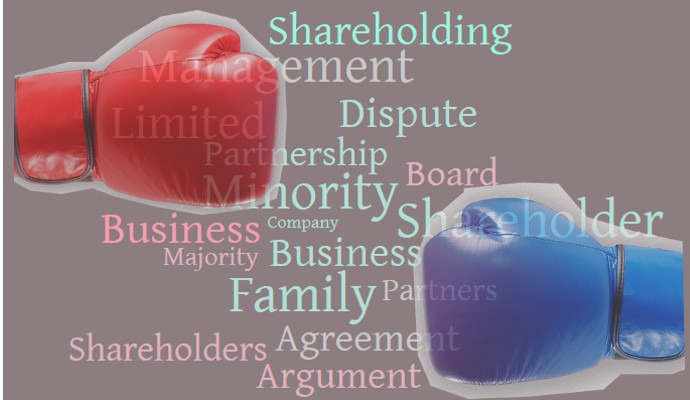Shareholder Disputes - How To Resolve Them If You Want To Sell Your Business

What if all the shareholders are not in agreement with respect the sale of the business (or the valuation)?
Unknown to most business owners, a minority shareholder can hold up a deal as buyers do not want to get involved in the possible acquisition of a business if there's any shareholder disagreement on these matters.
And minority shareholders can't be forced to sell their shares!
One option when faced with incalcitrant shareholders is to sell the assets of the business rather than the shares. However, this option is not without its problems. Further, the buyer may not want to purchase just the assets and may want to buy the entire company.
Graham Ross, also known as The Resolver, is one of the UK's leading lawyers on these shareholder disputes, and an expert in resolving them. He shares some thoughts below.
Falling Out With The ‘Other Halves’ of Your Business
... By Graham Ross
We all know that even the best of marriages go through the occasional sticky patch. There are advice agencies to help with reconciliation and, if it gets really bad, there is always the option of divorce. But what help is out there for that other ‘marriage’ in many of our lives, the one in which you team up with others to run a business?
Everything at first goes perfectly as you enjoy the success anticipated in the Business Plan. But then a few rocks begin to appear along the road as unanticipated problems arise and you suddenly realise, that, whilst you had a clear plan to be a success, you had no plan for how to handle failure.
Differences of approach between you all come to the surface. You may begin to see less of each other. Talking becomes difficult with an increasing use of email rather than popping in for a coffee and a chat. Problems exacerbate when one or more tries to dominate such as by locking the other out of the business. Occasionally, some may even be tempted to be unfaithful considering their options outside of the ‘marriage’ and even possibly preparing to set up a competing business.
Consider the following scenarios:-
- A key minority shareholder employee, unhappy at the downturn in relationships, decides to emigrate to New Zealand. When asked how much he wants for his shares, replies ‘ Why should I sell? The company is on the up. I think I’ll hold to them on as an investment’. This means that he will continue to enjoy dividends that are declared even though he does not work any more for the company and thus does not contribute any further to future success.
- Two shareholders, each with 50% and who are the only directors, fall out over future plans. One of them finds the lock on the premises has been changed and that his access to online banking and to the online accounting system, and to company emails has been stopped. He also finds that Companies House file shows him as having resigned from the Board when he did not.
- One shareholder withdraws a licence to the company to use a web domain critical to the online marketing of its business.
- A shareholder finds a non-director shareholder is running a competing business with the company.
These problems are common amongst those who ask me for help. They indicate a disturbing lack of knowledge with shareholders of the laws and rules that apply. I find that once I ensure all shareholders and directors have full knowledge, especially as to the downsides of their situation, they soon realise that it is in their own interests to reach an agreed arrangement. It is important people understand, for example, that:-
- locking out shareholders does not deprive them of the same dividends notwithstanding they no longer contribute to the business;
- telling an untruth to Companies House, such as that by filing a form to say that someone is no longer a director, does not make it true;
- barring a director from access to accounting information is an imprisonable offence;
- a director who sets up a competing business without the agreement of all shareholders, or who otherwise prejudices the trading of the company, such as by withdrawing the ability of the company to edit its website, can be made personally liable to compensate the company for the resultant losses. Moreover the legal action against him by the company can be taken out by a minority shareholder, even if he is not a director;
- without a Shareholders Agreement requiring such, a shareholder who resigns from working for the company, and/or from the Board, cannot be forced to give up his shares;
- minority shareholders can pass Resolutions against the vote of the majority by exploiting the little known rule whereby voting is initially by head count unless someone formally calls for what is termed a ‘Poll’.
Many situations such as the above and similar can be avoided, or resolution more easily achieved, whether through reconciliation or a managed exit, when all have entered into a Shareholders Agreement.
The law is primarily set out in the Companies Act 2006, but more specific rules for the operation of the company are set out in the obligatory Articles of Association (which the public can view online) and in any Shareholders Agreement (a private document the public do not see). One of the problems is that, whilst, increasingly, people use online formation agents, it is rare for these organisations to give an option over the content of the Articles of Association. We now have a default Model Articles but many formation agents include their own bespoke versions which they may have been using for some time. I would imagine very few people bother to read them.
As with divorce, if agreement cannot be reached then mediation is the wise route to take. One of the techniques of the mediator is to engage in separate parallel discussion with each shareholder. Each discussion is protected by confidentiality so that what one shareholder, or one group of shareholders, says to the mediator will not be disclosed to the others without specific permission of the shareholder(s). This avoids people holding back on what they tell the mediator out of fear it will be passed on to the others. In this way the mediator benefits from a very rich and accurate understanding of what is really causing the dispute, what people are seeking and how it can be resolved.
I find in mediating these disputes, or helping one or more shareholders by drawing up a negotiation strategy to follow, that, once everyone has a complete understanding of the law and rules that apply, they soon realise the negative consequences for themselves of not resolving the dispute such that they begin to want to resolve it.
If a dispute does arise, the Shareholders Agreement should also set out the manner in which it can be quickly resolved. In this way you can begin to focus more on the business rather than on arguing amongst yourselves to the detriment of the business.
A well drawn up Shareholder Agreement will also have the advantage of making the company more attractive to investors.
In conclusion, we can reduce the risk of internal company conflict by promoting what I would call ‘safe shareholding’, being increasing shareholders’ knowledge of company law and rules and having everyone sign a Shareholders Agreement. I would also like to see those with influence, such as investors, accountants, start up agencies, banks etc doing far more to better inform shareholders and directors of the law and the rules. In fact, Companies House should refuse to list a formation agent unless they commit to including a short guide to company law and to the specific set of Articles being used as well as explaining about the importance of having a Shareholders Agreement.
Stability in marriage, whether formal or a civil partnership, has an enormous impact on society. Surely, to a similar extent, the economy benefits from stability in smaller companies. Shareholders should wise up, stop trying to ‘pull a fast one’ on partners, and work together to see through their differences.
Footnote by Clinton:
Should you need assistance with a shareholder dispute, I recommend you contact Graham at his site. Note: I endorse Graham's view that having a proper Shareholders Agreement in place does make a business more attractive to buyers. If you don't have one now, I recommend you speak to Graham about creating a bespoke Shareholders Agreement for your business.

